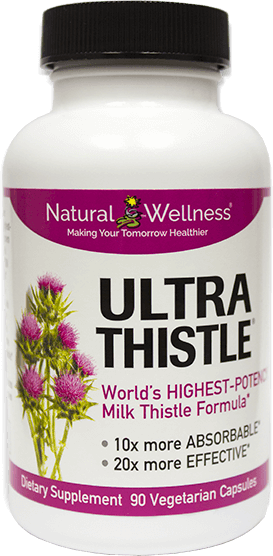Siliphos® Clinical Studies Index
Read about studies conducted on Siliphos, the active ingredient in UltraThistle.
-
(Ref20C15) Effect of Siliphos® on chronic active hepatitis
Study shows significant reduction in elevated liver enzymes (and therefore hepatocellular necrosis) in just one week of treatment with Siliphos®.
-
(Ref21C13) Therapeutic effect of Siliphos® in chronic liver disease
A small study of eight human subjects with chronic active hepatitis. This study shows significant benefits of Siliphos® after just two months treatment. -
(Ref8P22) Direct comparison of Siliphos® to standardized milk thistle extract
Study shows nearly 10x the bioavailability of Siliphos® over the world's best selling standardized extract. -
(Ref18C14) Useful dosages of Siliphos®:
Shows definite advantages of Siliphos® at dosages ranging from 160mg to 360mg (measured as silybin). Dose/effect relationship is also demonstrated with the highest dosage tested getting the most dramatic results. -
(C10) Considerably greater bioavailability of silybin as a component of Siliphos®:
Laboratory study shows that binding silybin with phosphatidylcholine on a molecular level dramatically improves its bioavailablity on a cellular level. -
(C3Medline) Increased oral bioavailability of Siliphos® in humans:
Human study compares Siliphos® and the worlds best selling standardized milk thistle extract and shows how much better the results are with Siliphos®. -
(Ref9C8) Effect of Siliphos® on cirrhotic patients:
Study shows that Siliphos® does not significantly differ in its safe and beneficial activity in patients with cirrhosis vs. healthy control subjects. -
(Ref10C2) Long term usage of Siliphos®:
Study shows the beneficial properties of Siliphos® are not diminished by sustained usage of the product. -
(Ref12P19) Liver damage control properties of Siliphos®:
Siliphos® shows significant protective activity against liver damage. This study tested Siliphos® protection against a variety of toxins. -
(Ref13P6) Free radical scavenging properties of Siliphos®:
Study shows the capability of Siliphos® to scavenge free radicals and inhibit lipid peroxidation. It also demonstrates significantly higher blood plasma levels of silybin when administered as a component of Siliphos® rather than in its unbound form. -
(Ref14P13) Effect of silimarin on lipid peroxidation:
Study shows milk thistle extract (silymarin) to be a helpful antioxidant and silybin to be the most valuable constituent of silymarin. -
(Ref15P16) Siliphos® counteracts hepatotoxic effects:
Study shows Siliphos® protects liver cells against free-radical mediated toxic liver injury. -
(Ref16P23) Antioxidant activity of Siliphos® against alcohol:
Study shows how Siliphos® is dramatically more effective than pure silybin alone. Concludes Siliphos® may be useful in counteracting damage caused by alcohol intake. -
(Ref19C6) Tolerablility and effectiveness of Siliphos®:
Study shows high dose tolerability of Siliphos® as well as its increased effectiveness over conventional standardized milk thistle extract. -
(C6Medline) Liver protection potential of Siliphos®:
Study shows the antioxidant and free radical scavenging effect of Siliphos®. -
(Ref7P12) Comparative bioavailability of Siliphos® vs. silybin:
Study shows exactly how much better silybin is absorbed when combined on a molecular level with phosphatidylcholine (a patented process resulting in Siliphos®). -
(Ref11P1) Liver protective activity:
Shows Siliphos® is more effective than its constituents, silybin and phosphatidylcholine, alone. The effectiveness of Siliphos® is considerably greater than the sum of its parts.

